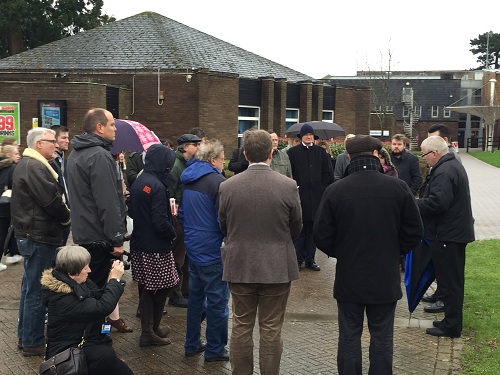Victims remembered during University of Northampton’s Holocaust Memorial Day
Date 29.01.2016
29.01.2016
Students and staff from the University of Northampton gathered to remember those who perished in the Holocaust at a poignant ceremony today (Friday 22 January).
The University’s Multi-Faith Chaplaincy team coordinated a stone-laying ceremony at Park Campus, which saw attendees place a stone under the Anne Frank and Stephen Lawrence Memorial Tree. Footage here.
Father Andrew Behrens led the ceremony, while Billy Mann, a third-year History undergraduate, recited the University’s Statement of Commitment to remembering the Holocaust.
Following the ceremony, Professor Tom Lawson delivered a keynote public lecture titled ‘Britain, Genocide and the Holocaust’ at Sunley Conference Centre, Park Campus. This was followed by followed by further talks and activities, including a student presentation on contemporary fascism in Britain.
Dr Paul Jackson, Senior Lecturer in Modern History, who organised the event with colleague Dr Nicola Cooper, said: “Remembering the Holocaust remains as important as ever.
“It was an event that symbolised the extreme ways people can treat each other, and sadly genocide and political extremism have not gone away either.
“Reflecting on the history of the Holocaust helps us all become more aware of the extreme attitudes that existed well before the rise of the Nazi regime, and unfortunately are still with us today.”
You can listen to Paul talk about the day on BBC Radio Northampton. The interview begins 2hours 51minutes into the programme.
On Wednesday 27 January, the University’s Father Tim Curtis will be appearing at Northampton Borough Council’s Holocaust commemoration, where he we will presenting on the genocide in Srebrenica in the 1990s. More details here.
The University of Northampton’s Statement of Commitment to remembering the Holocaust reads:
- We recognise that the Holocaust shook the foundations of modern civilisation and its unprecedented character and horror continues to hold universal meaning.
- We will strive to ensure that future generations are made aware of the Holocaust and other more recent genocides e.g. in the former Yugoslavia, Rwanda – and reflect upon their consequences. We vow to remember the victims of all genocides and will also do all in our power to prevent future genocides from occurring.
- We are proud of our diverse, multicultural, multi-racial and multi-faith community. We pledge to strengthen our efforts to promote education and research about the Holocaust and other acts of genocide/injustice/discrimination. We will do our utmost to ensure that the lessons learnt from these events are fully understood and disseminated.
- We value the sacrifices of those who risked their lives to protect or rescue victims of the Holocaust and other genocides as a permanent reminder of the human capacity for good in the face of evil.
- We recognise that humanity is still scarred by the misconception that some people’s lives are worth less than others because of their disability, race, ethnicity, gender, religion or sexuality. Racism, anti-Semitism, xenophobia, homophobia and discrimination still persist, and we have a shared responsibility to fight these evils.
- We value the right of all to live in a free, tolerant, just and democratic society. We believe that the Holocaust and all other genocides must have a permanent place in our collective memory and we honour the survivors still with us.